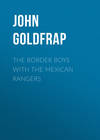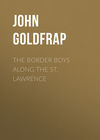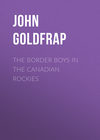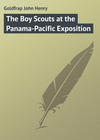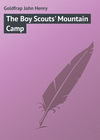Kitabı oku: «The Border Boys with the Mexican Rangers», sayfa 8
CHAPTER XVIII
BLACK RAMON’S TRICKERY
“This looks like some of that rascal Ramon’s work!”
Jack paused in the fruitless search and wiped the perspiration from his forehead.
The officer of the Rangers, whose name was Antonio Del Rio, carefully rolled a brown paper cigarette and lighted it before he glanced up at the troubled young countenance before him.
“I think you are right, senor. During your absence he and his band must have surprised the camp and carried your amigos off as prisoners, that is, unless they themselves have taken to the trail.”
“And leave me behind! Not likely. No, senor, they have met with some foul play.”
“I proffer you my services and those of my Rangers,” was the prompt rejoinder, “we will set out at once.”
“But the question is, in which direction shall we go?” asked Jack, frankly bewildered.
“Wait. I will call Juan Andreas. He is the most expert tracker in the Rurales, and if there is a chance of picking up their trail, he will do it.”
Andreas proved to be a small, shrivelled Mexican on a “paint” or spotted pony. Jack saw that his eyes flashed like those of an old hunting dog, as, in obedience to his superior’s command, he slipped from his pony and began running about in the surrounding woods, crouching low, with his nose almost on the ground.
Suddenly he stopped, straightened up, and with a gesture almost regal, he raised a hand and pointed to the west.
“They go that way,” he said in Mexican.
The young officer nodded. The notes of the bugle rang out, and an instant later the camp site was once more deserted as the cavalcade dashed off through the dense woods in hot pursuit of the missing men and boys.
It is now time that we inquire for ourselves just what was happening and had happened to Ralph, Walt, Coyote Pete and the professor. After Jack had left the camp then, the professor with his geological hammer had started out to get specimens, of which he already had several pounds, much to Coyote Pete’s disgust.
He wandered down the canyon and had perhaps gone further than he intended, when suddenly he was seized from behind, his arms pinioned and the cold muzzle of a pistol pressed to the back of his neck.
“Now march,” came a crisp order, and the man of science, being also a man of discernment, “marched.” He did not dare to turn his head, but from the trampling of hoofs behind him he judged that several men must be following in his wake. Before long he found that they were undoubtedly headed for the Border Boys’ camp. But he dared make no outcry, for the old man had guessed already that his captors must be Black Ramon’s men, and he knew that they held human life no dearer than so much dust.
Arrived near to the camp, the old man was tied to a tree and gagged, and then his captors, whom he now recognized as Ramon’s band, scattered among the trees in such a manner that they completely encircled the camp. All at once one of them began to make a peculiar sound, – a perfect imitation of the “gur-gur-gur-gobble” of the wild turkey.
How the professor longed to warn the boys of the crafty trap that was being set for them! But he was powerless to do anything. As the wily band of marauders had guessed, the “skirling” of the supposed turkey was enough to set the camp agog. Snatching up shotguns, Walt and Ralph plunged off into the underbrush. They had not gone twenty paces before the brigands, noiselessly as panthers, seized and bound them, old coats being held over their heads to prevent their making any outcry. This done, they were bound to the same tree as the professor.
The capture of Coyote Pete alone, now remained to be accomplished. For, as we know, though the marauders were not aware of the fact, Jack was far from the camp at the time. But in Coyote the Mexicans caught a Tartar. The old plainsman was frying some bacon, stooping low over the coals, when the sharp crack of a twig behind him caught his attentive ear. Like a flash he bounded erect, but not before the muzzles of a dozen rifles were aimed at him from the underbrush.
Black Ramon was taking no chances with Coyote Pete, whom he knew both by reputation and experience.
For one instant, as he took in the situation, Coyote was still as a figure carved from marble. Only the heaving of his chest under his blue shirt showed that he was, for him, considerably startled.
Suddenly, and without the slightest warning, the old plainsman crouched low, and then dashing straight at the nearest Mexican, seized him by the legs, and before the others had recovered their senses, he had hurled the fellow backward by an expert wrestling trick. The astonished Mexican alighted in the midst of the campfire, overturning the spider, from which he was plentifully sprinkled with scalding bacon fat.
In this way Coyote, cut off from reaching his own weapons, managed to possess himself of a rifle.
“Now,” he shouted, “the first varmint that fires at me gets some of this lead. I may only have one shot, but I’ll make that one tell.”
A storm of bullets was the result, but Coyote with that quick foresight which was his characteristic, threw himself flat behind a large rock, with the result that the leaden hail spattered against the solid stone.
Suddenly a figure on a black horse rode into the little clearing. It was Ramon himself. Without the slightest hesitation Coyote threw up his rifle to his shoulder, and, disregarding his own danger, fired point blank at the outlaw leader.
But for once Coyote Pete’s aim was at fault. Ramon was not even scratched by the missile.
“Gosh!” exclaimed Pete, “I begin ter think thar is suthin’ in that story that he bears a charmed life arter all. I had a plum bead on him and – ”
In his astonishment at his missing such an easy shot, the cow-puncher had not noticed several forms creeping through the dark woods behind him. Before he had a chance to defend himself, he was dealt a mighty blow on the back of the head by a “clubbed” rifle in the hands of one of the outlaws whose head was encircled by a big bandage.
“Take that for the blow you struck me at the rancho,” grunted the fellow, as Pete, spreading his arms, fell forward like a stunned ox. The man who had dealt the blow was the same whom Pete had knocked off the ladder on that memorable night at the lonely rancho.
“Pick him up and place him with the others,” ordered Ramon, without the slightest trace of any emotion whatever showing on his copper-colored face.
This order was swiftly carried out, and the consternation of the others may be imagined when they saw the cow-puncher’s lanky form being carried by two of the raiders. They had heard the shots and at first they feared that Pete was dead, but to their relief, the next minute, they overheard Ramon remark:
“Throw him upon his horse when you bring it up. He’ll be all right in a short time.”
Presently the boys, with eyes that flamed with indignation, saw the Mexicans leading up their stock, not forgetting the pack burros, whose burdens had been hastily hitched on.
“Caramba, but I would like to lay my hands on that other one, that Merrill boy, more than all the rest,” snarled Ramon through his yellow teeth. “Take the gag out of that boy’s mouth yonder, and ask him where Jack Merrill is,” commanded Ramon of one of his men, none other in fact than the Acosta for whom Jack had been mistaken.
Ralph was the prisoner designated by Ramon, and not a little relieved was he to have the not-over clean bit of cloth, with which his mouth had been stopped, removed from his teeth.
“Now then,” blustered Ramon, “where is Jack Merrill?”
“Far from here and on a mission to Santa Anita,” retorted Ralph boldly. He was an honest lad, but in such a case deceit was the only course possible. If he had told the truth, the bandits were quite capable of hiding and waiting for the boy, thus enmeshing the whole party.
“What has he gone there for? Be careful, boy, and speak the truth.”
“To get the Mexican Rangers to run down all such rascals as you,” was the bold reply, and one which an instant later Ralph wished he had bitten out his tongue before he made.
“Well, that being the case, forewarned is forearmed, as you say in your country,” rejoined Ramon. Then in Spanish he gave orders to mount immediately. First, however, he presented Jack’s pony Firewater to Acosta, as a recompense, presumably, for the loss of the latter’s own animal.
The boys and the professor were hustled into saddles and their legs tied together under the ponies’ bellies. Ramon stood by looking on sardonically while this was being done.
“You are not at the lone rancho now,” he chuckled, “but in the heart of the most lonesome range of mountains in Mexico. That was a clever trick of yours to escape with the senorita, but now you are going to pay for it. Ah, yes, I shall have a revenge, and such a revenge it will be, too!” He showed his long yellow fangs as he spoke, and chuckled hideously. In spite of their determination to be calm, the lads shuddered a bit. But the professor stared stonily at the ruffian.
“Am I to understand that it is your intention to abduct us?” he demanded.
“It is,” was the rejoinder, “I mean to make you useful to me in many ways. As my slaves in Trembling Mountain I’ll make you wish every hour of the day that you had never tried to thwart Black Ramon. Forward!”
At the command the band dashed off. Coyote Pete, still unconscious, tied to the saddle of his horse. The boys’ gags had been removed, as had the professor’s of course, and as the rush of hoofs drowned other sounds, Walt found an opportunity to say to Ralph:
“Thank goodness, old Jack’s still at large. Depend upon it, he’ll find some way to get the Mexican Rangers and help us out of this.”
But Ralph shook his head.
“We’re at the last ditch now, Walt,” he replied. “I don’t see a chance for us.”
CHAPTER XIX
WHAT COYOTE DID
Coyote Pete, as Ramon had prophesied, came out of his swoon before long. His return to consciousness was enlivened by some of the most picturesque language the Mexicans had ever heard. But as Coyote had been tied to the saddle he could not relieve his mind otherwise than by using all the opprobrious names he could select from a copious vocabulary. Now it was a peculiarity of Pete’s that he never swore, – that is, actually used bad language, – but he had invented a language all his own to express his feelings when angry. Set down on paper it would look tame, but as Coyote Pete used it, it was tremendous, – exterminating almost.
But after his first outbreak, Coyote remained unusually calm. He was thinking with all his might, but all his thinking did not bring him any nearer to a solution of their difficulties. They were in the hands of the most bloodthirsty band of rascals in Mexico. Even if they escaped, they would be bound to perish miserably in those rugged wilds without food or the weapons to procure any. The nearest settlement, Pete knew, must be at least two hundred miles away, and probably more.
Truly, it was not a cheerful predicament. In fact, as Ralph had said, it looked very much like the last ditch. But Coyote was not of the kind of human that gives in and throws up its hands just because on the surface of things it seems time to abandon hope. Far otherwise, as the readers of other volumes of this series know. There probably was not a cooler head nor a better one along the border than Coyote Pete, but even he had to own that, for the present anyhow, he was “stumped.”
At noon a halt was made for a few minutes, and frijoles, corn bread and muddy black coffee (cold) was given the prisoners. The professor could not eat, he was in such a state of mind. But the others fell to heartily enough; the boys, because they were boys, with appetites that nothing could upset, and Coyote Pete, with the idea of “firing up” with nourishment in case he might find some way out of it for all of them.
All the afternoon they traveled, reaching higher and higher altitudes. Every now and again Ramon would consult earnestly with the red-haired outlaw of unmistakably American origin, who had, as Jack felt certain, left the warning notes on two occasions, – once at the camp in the canyon, and again at Don Alverado’s fete. But on the latter occasion, unless it was one of the band that hurled the sombrero at Firewater’s head, the outlaw’s plans did not seem to have materialized.
But if this man was friendly to the boys he did not give any sign of it. Instead he glared at them as malevolently as did any of the others.
“You’re the kind of American that looks best decorating a tree,” thought Pete, who was now allowed to sit erect on his pony, although, like the boys and the professor, his feet were tied underneath.
On and on they traveled throughout the afternoon, Ramon urging his followers up to a terrific pace considering, that is, the nature of the country they were traversing. Now they would plunge down into dark and gloomy defiles where perpetual purple twilight reigned, and again on mounting some crest they would see, spread out before them, a panorama of much the same sort as had so delighted Jack on the cliff summit before he fell in with the Mexican Rangers.
“If I don’t miss my guess,” said Pete, when he found a chance to exchange a word with the boys, “we are getting into the Trembling Mountain country. See that big peak over thar? It’s smokin’ away like old man Jones with his corn cob evenin’s.”
This was a fact. The smoking mountains, smoldering volcanoes that the boys had observed in the distance on their trip into this wild country, were in fact getting closer. And splendid sights they were, too. Some of them shot up into the blue sky to a height of fully seventeen thousand feet. The walls of the canyons they began to traverse now were different, too, from those they had left behind them. Instead of being composed of dull gray or slate colored rocks, these great rifts flamed with red and yellow strata, intermingled with gorgeous bands of purple and sometimes wavy strata of green. Evidently the internal fires of the earth had been busy here in the youth of the globe.
Occasionally, boiling springs sending up jets of sulphurous-smelling steam and bordered by brilliant green plants, were encountered. It was the most impressive country the boys had ever traveled through, and had a few fiends, all dressed in red, with hoofs, horns and tails complete, suddenly appeared from behind a mass of rocks, they would hardly have been surprised. The place seemed a fitting setting for an Inferno.
By dusk they were on a sort of plateau at the mouth of one of these mountain canyons. Trees and rocks of normal shapes and hues stood about in almost park-like fashion. Wild oats and plenty of bunch grass offered good and abundant feed for the horses, and from a cliff side of this little oasis in that land of gloomy horrors bubbled a crystal spring of cold water.
No wonder Ramon, with his countrymen’s instinct for selecting good camp sites, elected to halt there. As for the boys, even in their predicament, they could not help admiring the soft intimate character of the scenery, coming, as it did, after their experiences in the gloomy abysses and profundities behind them.
The prisoners were taken from their horses and then carefully rebound, although so stiff were their limbs from their long confinement that it is doubtful if they could have run just then, even had they found an opportunity. Supper was the same rough meal as the midday refection had been. To add to the unpalatable nature of the food, the boys had the doubtful pleasure of watching Ramon and his followers dine sumptuously on the contents of the Border Boys’ packs.
As night fell sentries were posted about the camp, and the prisoners could not but admire the caution which led Ramon, although in a presumably uninhabited part of the country, to post his outguards as carefully as if an immediate attack was to be expected. One by one the outlaws threw themselves on their blankets and were soon wrapped in that heavy slumber characteristic of the hardy dwellers of the open places. Only Ramon did not sleep. For hours he strode up and down in front of the fire with his head sunk on his breast. He seemed lost in thought. Once or twice he paused and seemed to listen intently. Was it possible that with his half-wild instinct he sensed the peril that was even then drawing in upon him through the night?
At last, however, even he sank off into slumber, and then, with the exception of an armed outlaw posted to guard the captives, the camp was enveloped in dense silence. The guard hummed softly to himself some old Spanish riding songs as he sat by the blaze, the firelight playing on his almost black features.
There was some tall grass at the back of the spot in which the boys and their elders had spread themselves out to snatch uneasy slumbers, and before long Pete’s quick ear detected a stirring in it. Suddenly a voice spoke softly:
“Don’t say a word or appear surprised, I’m going to help you out, just because I’m a Yankee myself and I know Ramon means to kill you all when he gets a chance.”
Coyote kept a hold on himself, and hardly moving his lips, rejoined in the same cautious tones:
“Who are you?”
“That doesn’t matter,” replied the other, who was the man we know as Canfield, the former friend of Ruggles the miner, “it’s enough to say that I was once decent, back north; but that’s long ago, and no use crying over it. Look out, I’m going to cut you loose.”
As the words were spoken, Coyote felt the unseen Samaritan slash his bonds, but the cow-puncher prudently did not at once draw his hands from behind his back. Instead, he darted a furtive look about. The sentry, crooning by the fire, seemed to be half asleep. Doubtless he didn’t see much sense in giving too vigilant a watch to such helpless prisoners.
“I tried to keep you out of this, you know,” came the voice again; “I got one note to you and got shot for my pains. Then again at Don Alverado’s fete I despatched another one. It was Ramon’s intention to shoot Jack Merrill that day, but the vengeful Mexican, Jose, took the task out of his hands.”
“Was Ramon in the crowd?” gasped Coyote in astonishment.
“Yes. But he is as skillful in disguise as he is in most other things. He was disguised as an old peddler of sweetmeats. But in his basket he had hidden a carbine, which if he had ever used it, would have put that young Merrill out of the way forever.”
“Great bob cats! he – ”
But a sudden rustling in the grass behind him apprised Coyote at that juncture that he was alone. With another quick glance about he set to work on his leg-thongs. So intent was he on his work that perhaps he relaxed his vigilance a trifle, for when he looked up, directed by some strange instinct to do so, it was to see the form of Ramon standing over him with a revolver pointed grimly at the cow-puncher’s head.
In this terrible emergency Pete’s mind was made up in a flash. With one quick slash he finished freeing himself, and then, shooting up like an uncoiled spring, he rocketed forward just as Ramon fired. The ball grazed his cheek, but before Ramon could pull the trigger a second time, Pete had rushed in between his legs upsetting him with a crash. So heavily did the Mexican chief fall that he was stunned for the instant, but the drowsy guard by the fire suddenly galvanized into action, and sent a bullet flying after the cow-puncher as he vanished in the darkness.
The uproar awakened the other captives, who realized as soon as they saw that Coyote had gone, what must have occurred. Their hearts beat fast with apprehension for the brave plainsman, as Ramon, coming out of his swoon, ordered the now aroused camp to saddle at once and scatter in pursuit of the refugee. The outlaw chief himself took part in the search, leaving only three men in the camp to guard the captives. As the sound of the pursuing hoofs grew faint and far the boys interchanged gloomy looks. If Coyote had not seized a horse the chances were all against his making good his escape, however he had managed it.
“I fear we are worse off than ever, now,” moaned the professor, shaking his head gloomily.
Coyote, meanwhile, who had familiarized himself with the nature of the country as they rode through it in the afternoon, made at once for the tall scrub and brush at the lower end of the valley. Through this he glided like a snake, and had put half a mile between himself and the outlaws’ camp before he heard the clatter of horses’ hoofs. He listened a minute and then shook his head grimly.
“Bad!” he muttered, “they’re doing just what I thought they would, spreading out in fan-shaped formation. The only chance fer me ter escape that human fine comb is to outflank ’em and double back.”
Crouching low he darted along once more, heading this time, however, in a direction sideways from his former course. If he could reach the end of that line of horsemen before they encroached on his line of progress he might escape them yet. He found himself hoping that they were riding in open formation. If that were the case, – although the starlight was pretty bright, – he might be able to slip in between two of the riders.
On and on he dashed and was just deeming that success had come to him when he was brought to an abrupt halt. Before him yawned blackly a chasm of some sort, and Coyote had seen it only just in time to avoid plunging over its brink into the unknown depths below. The thought chilled him. He shuddered apprehensively.
“One more step and it would have been ‘goodnight, Coyote,’ fer sure,” he soliloquized.
Suddenly there came a loud shout behind him. It was followed by a fusilade of bullets whistling about his ears and pattering against the rocks. In his shock at finding how near he had been to a terrible death, Coyote had thoughtlessly stood erect. Thus he offered a target that could be seen for some distance against the stars. That this had been the case, he could not doubt as the shouts grew closer.
For one of the very few times in his life that such had been the case, the old plainsman was at a loss. In front was the chasm. Behind, the Mexicans. But suddenly he saw something that he thought might serve at a pinch.
It was a log, decayed and hollow, that lay near the edge of the gulf into which he had so nearly fallen. The instant he perceived it, Pete dived into it. Not that he did not feel some repugnance to such a thing, for it was punky and rotten and might, for all he knew, have sheltered snakes. But there was nothing else for it. Hardly had he crawled inside it, carefully drawing in his legs, before Ramon and the advance guard of the pursuers rode up.
Coyote Pete lay perfectly still. He hardly dared to breathe, and heartily wished that he could suspend his heart-action.
“Caramba! He was here an instant ago!” exclaimed Ramon, glaring about, “where is the accursed Gringo now?”
“Possibly struck by a bullet,” put in Canfield, the red-headed man, who, having aided Pete to escape, was now compelled to assume a bloodthirsty role once more.
“Not likely. Perhaps he dropped over the edge of the cliff and has escaped,” put in another of the outlaw band who had just ridden up.
“But that would be suicide. The gully is deep and he would be dashed to pieces in its depths,” struck in another.
“Hold on!” shouted Ramon suddenly, “I have it!”
“What, you see him?” the query came from a dozen throats.
“No, but I can guess where he is.”
“Where?”
“Here!” Ramon tapped the log with his foot, while Coyote Pete fairly perspired in rivers.
“Let’s make sure,” cried the voice of Canfield. He was about to dismount when Ramon checked him.
“No. I have a better way.”
A kick on the log emphasized the Mexican’s statement, and a sharp shock passed through Coyote at the thought of the awful fate in store for him. Had he had time at that moment he would have emerged from the log and risked all. But before he could move, a dozen hands laid hold of the timber and began to roll it toward the cliff edge.
“Stop!” shouted Pete.
“Ha!” exclaimed Ramon, “then I was not mistaken. Good! Go to your grave, you Yankee pig, in the coffin you have made for yourself!”
Faster and faster the log rolled, while cries of real fear and entreaty broke from Coyote’s lips. In vain he tried to extricate himself.
All at once, the log gave a clumsy leap, and, amid a brutal shout from the Mexicans, it spun over the edge of the gulch and shot sheer over into the black void that yawned below.
